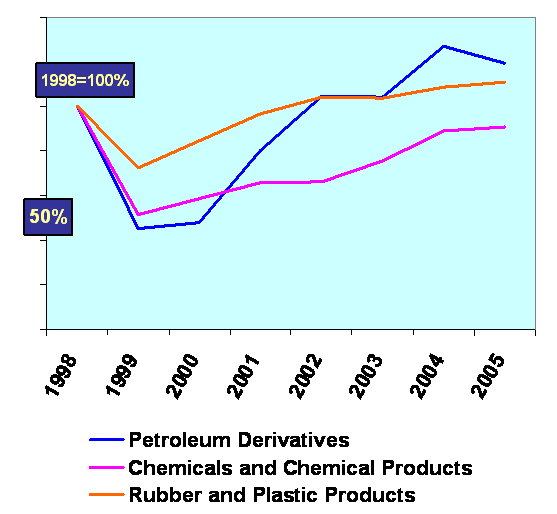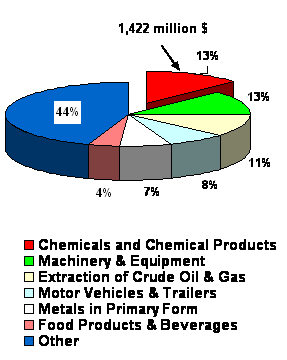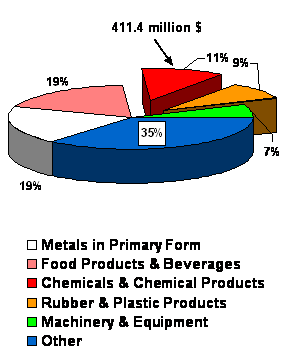Actual Status of Chemical Industry and Allied Industries
in Serbia
The
most successful period for chemical industry, as well as for
the complete industry of Serbia, were the 1970’s. Concerning effects of
erected manufacturing facilities, the most favorable times
were the 1980’s, when chemical industry and rubber industry
of Serbia had
6 to 8 thousand of various products in their production programs
and global production volume at the level of 8-10 million
tpy.
Record
volume of production chemical industry achieved in 1989 and
rubber industry in the middle of the 1980’s. In the year 1989
a record was reached in employment, which equaled about 63,000
in chemical industry and 20,000 in rubber industry, and also
in share of chemical industry and rubber industry in gross
domestic product of industry, which was 10.6%.
Record
export level of chemical goods of around 600 million $, which
was approx. 11% of the value of the total export of Serbia, was reached in 1990.
In
the year of 1991, geopolitical disintegration of the former
Yugoslavia was in process and economic
processes became irregular, which was especially emphasized
by the sanctions of the United Nations imposed on newly formed
country FR of Yugoslavia, the federal unity of the Republic of Serbia and the Republic
of Montenegro.
Establishing
of multi-party system in Serbia and the disintegration of the former Yugoslavia modified significantly economic conditions. Firsts of all,
important changes appeared in property relations. State (public)
property, social property and private property were formed.
Transition has started but it is neither finished nor stabilized.
Liberal conditions for registration of the companies resulted
in a great number of new companies being established on the
basis of private capital. Only in the field of manufacturing
chemical industry, over 1,500 companies were registered. However,
great majority of these new companies are still today without
legal status and practically without the chance for manufacturing
activity. Besides, there is no accurate evidence regarding
volume and assortment of production of the private companies
that are really active, which hinders making analysis, estimations
and taking certain steps for the improvement of business activities.
On
the other side, the disintegration of the former Yugoslavia
caused essential reduction in the market as well as the reduction
in domestic offer, having in mind that a significant number
of facilities for production of chemical goods, mainly those
more sophisticated, were developed in Slovenia and Croatia.
Finally,
embargo on the imports of crude oil, gas and other raw materials
imposed by the United Nations by the end of 1992, practically
closes many industrial facilities and almost 100% facilities
of the basic chemical industry, especially petrochemical.
Owing to this, in 1994 the volume of manufacturing of basic
chemical industry and rubber industry was at the level of
only 16%, 19% respectively, of the realization in the record
year of 1989. (In the manufacturing section of chemical industry,
in spite of the embargo, level of about 42% average was achieved
in 1989).
It
is interesting, however, that important efforts were made
in the field of domestic crude oil and gas extraction precisely
during the period of UN embargo. Thus, production of crude
oil amounted to 1,165,000 tons in 1992, and of natural gas
amounted to 962 million cubic meters in 1993, both quantities
belong to the group of records.
The
disintegration of SFRJ, followed by the sanctions of the UN,
resulted in serious consequences for Serbian chemical and
rubber companies. After the disintegration of the country,
Serbia was left without a large number of products
that had been provided on the domestic market. The important
ones are products from the group of polymers such as PS, PET,
ABS, a part of the assortment of chemical fibers and a significant
number of base organic products (especially aromatics) and
their derivatives, especially those from the group of fine
or special chemicals.
In
the field of inorganic chemicals Serbia was left without domestic
offer of soda ash, calcium carbide, carbon black, titanium
dioxide, sodium perborate, hydrogen peroxide and some explosives
and other chemicals. Motor-car industry was left without numbers
of plastic accessories. Rubber industry was left without a
great number of assortments of heavy pneumatics and a part
of rubber-technical goods.
Upon
imposing the UN sanction, almost total basic production stalled,
and the industry was almost totally left without organic chemicals,
polymers, synthetic resins, synthetic rubber, caustic soda,
mineral fertilizers and other products of basic chemical industry.
Within the basic chemical production, manufacturing of plant
protection preparations was the most successful. Oil refineries
reduced their capacity utilization to the level of supply
from domestic oil-fields.
Processing
capacities, however, more easily survived stresses stemming
from the disintegration of the former SFRJ and sanctions.
The most successful one was pharmaceutical industry, in most
of the situations taking over parts of manufacturing assortment
of medicaments from the disintegrated republics by overcoming
the problems of imports of raw materials, and even struggling
for new markets.
The
United Nations’ sanctions against FR of Yugoslavia were canceled
in the second half of 1995. Restoring of production activities,
especially those in the basic chemical sector, and regaining
the lost positions at world market required an enormous effort
from the exhausted domestic manufacturers. The realization
of the above mentioned tasks could not be a fast process,
so more serious effects regarding production and marketing
activities were still visible in 1997.
Unfortunately,
already in 1998 the crisis in Serbia’s autonomous province of Kosovo & Metohija rose by spreading up of the
Albanian separatists' terrorism. This crisis had been internationalized
and Serbia was accused of using over-measure force.
At the beginning of 1999 NATO submitted an unacceptable ultimatum
to the Serbia's government, which refused it, so in March 1999 Serbia was attacked. Many industrial facilities were seriously damaged
or completely destroyed during the 78 days of NATO’s air-campaign
and it should be underlined that the bombing was focused on
refineries and chemical plants. The petroleum refineries in
Novi Sad
and Pancevo have been almost totally destroyed, as well as
several large-scale chemical plants located in Pancevo, Lucani
and Baric. Especially significant financial and ecological
damage has been made in the town of Pancevo, where chlorine, VCM and ammonia plants
were bombed and badly ruined.
Development of Production by Branches Since 1998

Source: Statistical Office of the Republic
of Serbia
When
NATO military intervention against Serbia ended, the domestic chemical industry was,
for the third time in the last decade, at a new beginning,
starting from scratch. In other words, domestic chemical industry
entered the 21st century after about 10-12 years
of minor technological and technical development and almost
completely financially exhausted. Apart from that, most of
export markets have been lost and possibilities of approach
to the international financial resources were still poor,
which definitely was not a favorable position.
It
is obvious that current problems of domestic chemical industry
cannot be overcome immediately.
Bigger
complexes of basic chemical industry, having facilities largely
exceeding necessities of domestic market, are in a specific
position. This kind of local chemical manufacturers will very
likely have to think of their future through mergers or cooperation
with some foreign companies. The field of the chemical industry’s
processing facilities should be oriented to the enlargement
of production assortment and compliance of the quality of
products with the requirements of the world market, since
it is already very clear that the dimensions of domestic market
will be small to absorb the production of various chemical
goods while available production facilities are used.
However,
processing capacities more easily survived stresses stemming
from the disintegration of the former Yugoslavia and UN sanctions. The most successful one
was pharmaceutical industry, in most of the situations taking
over parts of manufacturing assortment of medicaments from
the disintegrated republics by overcoming the problems of
imports of raw materials, and even struggling for new markets.
In
spite of the above-mentioned long-term troubles, domestic
chemical industry still plays a very important role in the
Serbia's economy and external trade achievements. Its
share in gross domestic product of the overall industry of
Serbia is about 10.5%. The share of both chemicals & chemical
products and rubber & plastic products in total industry’s
gross domestic product overcame 14.2% in 2004.
Participation in Gross Domestic
Product of Overall Industry
(2004)
Chemicals
and chemical products play a very important role in external
trade of Serbia. In 2004, chemicals & chemical products were in first place
according to the share in total value of imports and in third
place according to the share in total value of exports. The
share of both chemicals & chemical products and rubber
& plastic products in total exports of Serbia overcame 20% in 2004.
Share of chemicals & chemical products in total external
trade of Serbia
(2004)
| IMPORTS |
EXPORTS |
| 
|

|
Previously mentioned problems are doubtlessly the
limiting factor regarding:
·
Possibilities
for recovery of production activities in a number of chemical
factories that operate at minor level of capacity utilization;
·
Competitiveness
of domestic manufacturers at the world market;
·
Perspectives
regarding future development.
However, there are several factors that could be
considered as comparative advantages of domestic chemical
industry. By order of their relative importance those factors
could be as follows:
·
Well
developed market of demand, both in Serbia and Montenegro, and gained export markets, especially in Russian Federation and other countries of
South-East Europe;
·
Well-skilled
staff with extensive experience in production management and
project management;
·
Available
sources of still non-exploited raw materials as follows:
o Metallic ores and non-metallic
minerals for use in inorganic chemistry (copper, manganese,
fluorides, borates, phosphates …),
o Sources of vegetable and
animal origin for use in “green chemistry” and oleochemistry,
o Some of basic petrochemicals
(propylene, raffinate-2, methanol, acetic acid) that are available
for use in the production of down-stream derivatives.
All competitive weaknesses and advantages of domestic
chemical industry have been evaluated in sub-project “Chemical
Industry”, which was an integral part of global project named
“The Strategy of Economy Development in Serbia up to 2010”.
This project had been organized and coordinated by the Government
of Serbia and Prime Minister personally. It started at the
end of 2001 and ended in the summer of 2003. The chemical
industry is classified in the group of domestic industrial
sectors having the best chances in realization of the export
oriented development strategy. The summary of investments
needed for realization of such a strategy and expected effects
is shown in Figure below.
Finally, almost all more important chemical companies
in Serbia already entered the process
of privatization (achieved by merging firms at tenders or
auctions) or into the process of restructuring (which will
also end in privatization). Some of them have already been
bought by foreign companies or local managers. The change
of property structure should be a real driving force regarding
future development of domestic chemical industry.
Serbian
chemical industry is probably a “small player” at World or
European scale but should be considered as “a very important
player” in the region of South-East Europe.